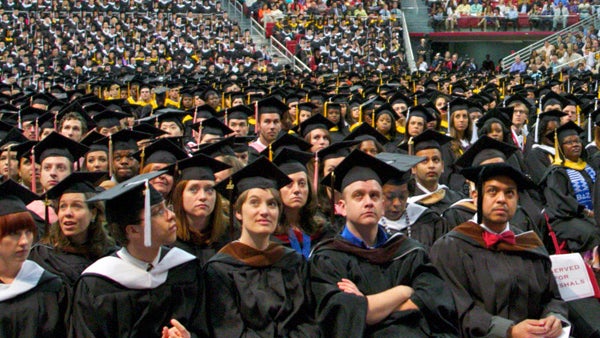When a college degree is not enough, Millennials must be entrepreneurs

Members of Temple University's 2012 graduating class attend their commencement ceremony in Philadelphia. (Nathaniel Hamilton/for NewsWorks, file)
Nearly three years ago, I got an important lesson in how little control we have over our own success when we put our employment in someone else’s hands.
I showed up for work one day at the Philadelphia Belle, an old-time paddleboat restaurant moored along the Delaware River waterfront, to a scene of eerie quiet. My bosses were huddled in the corner, no phones were ringing, nobody was working. A co-worker, seeing my confusion, explained that the Philadelphia Belle was bankrupt and closed for business, effective immediately.
Cradling a small box of my office possessions an hour later, waiting for the Market-Frankford Line at 2nd and Market streets, my situation seemed like a film stuck on a loop: Lehigh University graduate; 24 years old; unemployed; overwhelmed with student loan debt.
What I wanted most was to engage in meaningful work and to be self-sufficient.
College = success?
From an early age, I was taught that a college degree held the ticket to creating a financially secure future. Yet people of my generation were experiencing a conflicting truth.
Not long after graduating with a music education degree from York College, my friend Ben joined a charter school in Chester, Pa., to teach music. Today, six years later, Ben works as a business sales representative for Comcast. He was a casualty of Philadelphia’s dire education situation.
Finding another teaching job in the area proved difficult, and just like that, an accomplished trumpet player’s quest to instill his love of music into children ended.
Waiting on that SEPTA platform, I felt a directive bubbling up from within. I saw too many qualified and talented Millennials were unemployed or underemployed. I knew something had to change. I craved practical advice, strategy and instruction from successful people instead of relying the old, inaccurate chestnut “a college degree will make you highly marketable.”
So I interviewed people from all walks of life to find out what actions were creating their achievement? Interestingly, most of the people who enjoyed fulfilling work and experienced overall success were self-employed.
Career option: do it yourself
When I was growing up, entrepreneurship wasn’t even presented to me as a career option. The most I knew was that starting a business carried extreme risk. But I’m seeing the steady adoption of a do-it-yourself attitude among my friends.
The kinds of positions my peers trained for are no longer plentiful because U.S. corporations learned during the Great Recession how to generate record profits without hiring new workers. Unemployment among people age 18 to 29 hovers above 16 percent.
Creating your own opportunity is looking less risky than relying on a company to take a chance on you.
After graduating from the University of Pennsylvania, my friend Audrey left her corporate job to create a successful macaroon business in Philadelphia. Another friend Amber co-founded an events company that hosts the largest LGBTQ event in the northeastern United States. My friend Michelle created a dynamic marketing and events company and was named to Philadelphia Business Journal’s “30 Under 30” list.
They’re just one small sample of Millennials I know who embrace entrepreneurship.
Shifting the higher-education paradigm
I don’t believe everyone is meant for self-employment. Often, entrepreneurs work much longer hours than a traditional position. The separation between work and home life is almost non-existent. However, among the people I interviewed, the rewards of setting their own hours and focusing on personally meaningful work outweighed the negatives.
College is still valuable. Knowing what I know now, approaching age 27, I’d enroll again. But we need to make a clear change in the message we tell kids about their future. With the rising cost of higher education, and the uncertainty of whether a degree will lead to secure work, college should no longer be sold as a necessity — depending on what you want to do.
Local universities are beginning to acknowledge the drive toward building a business. Drexel University is creating a school of entrepreneurship. In July, Temple University’s business school announced a massive open online course with the goal of teaching and broadening entrepreneurial methods.
I’m excited to witness a paradigm shift about how we work and the available options. The Great Recession has been hard on everyone (except the 1%), Millennials especially. But through the struggle I see an opportunity for people to explore more avenues to fulfillment and success that might have previously been blocked or difficult to see.
—
Reginald Hall is the creator of FreshWisdom, a resource for Millennials to share skills, ideas, and actions for success.
On August 13, FreshWisdom, in partnership with Young Involved Philadelphia, is bringing together a panel of successful, young Philadelphia business owners to share their secrets for winning as an entrepreneur.
WHYY is your source for fact-based, in-depth journalism and information. As a nonprofit organization, we rely on financial support from readers like you. Please give today.

